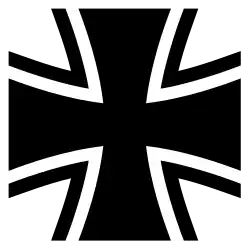Bundeswehr
The Bundeswehr (German for "Federal Defence Force"; ![]() listen ) are the German Armed Forces. The German armed forces are for the unified Germany itself and do not have several parts for the States of Germany.
listen ) are the German Armed Forces. The German armed forces are for the unified Germany itself and do not have several parts for the States of Germany.
| Federal Defence Forces of Germany | |
|---|---|
| Bundeswehr | |
 Insignia of the Bundeswehr | |
| Founded | November 12, 1955 |
| Current form | October 2, 1990 |
| Service branches | Heer (Army) Marine (Navy) Luftwaffe (Air Force) Streitkräftebasis (Joint Support Service) Zentraler Sanitätsdienst (Central Medical Services) |
| Headquarters | Bonn, Berlin and Potsdam |
| Leadership | |
| Commander-in-Chief | Defence Minister Thomas de Maizière[1] after declaration of state of defence: Chancellor Angela Merkel[2] |
| Minister of Defense | Thomas de Maizière |
| Chief of Defense | General Volker Wieker (Heer) |
| Personnel | |
| Military age | 17 |
| Conscription | No (Suspended on 1 July 2011) |
| Available for military service | 19,594,118 (2009 est.), age 17–49 |
| Fit for military service | 15,747,493 (2009 est.), age 17–49 |
| Reaching military age annually | 445,048 (2009 est.) |
| Active personnel | 207,247 active |
| Reserve personnel | 200,000 reserves |
| Expenditures | |
| Budget | € 31.1 billion (FY09) |
| Percent of GDP | 1.5% (FY09) |
| Industry | |
| Domestic suppliers | EADS Heckler & Koch Rheinmetall Krauss-Maffei Wegmann Howaldtswerke-Deutsche Werft Walther arms ThyssenKrupp |
| Foreign suppliers | |
| Annual imports | Volume of about $1 bln (2009 est.) |
| Annual exports | Volume of about $9 bln (2009 est.) |
There are five sections: three bigger ones: Heer (Army), Marine (Navy) and Luftwaffe (Air Force) form one unified force, not three separate fighting forces. And two smaller ones: Joint Support Service (Streitkräftebasis) and Central Medical Services (Zentraler Sanitätsdienst).
In peace-time the commander-in-chief is the Federal Minister of Defence, and in wartime the Chancellor of Germany. This is unlike most countries where the head of state is commander in chief.
In March 2012, there were about 207,000 soldiers serving in the Bundeswehr; there are another 200,000 in reserve. Conscription for the Bundeswehr has been abolished in July 2011.
Sources
- "Art 65a Basic Law". Gesetze-im-internet.de. Retrieved 2011-06-07.
- "Art 115b Basic Law". Gesetze-im-internet.de. Retrieved 2011-06-07.